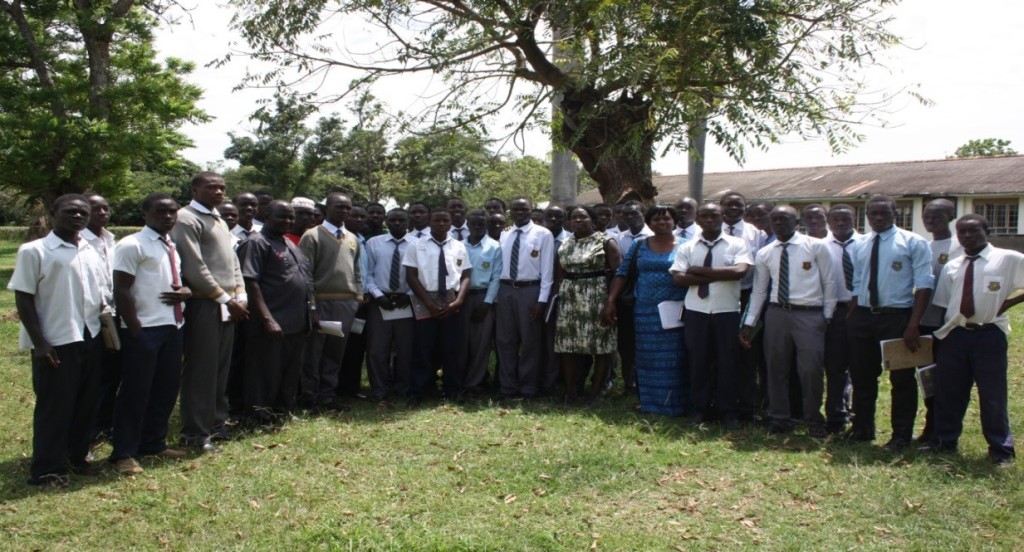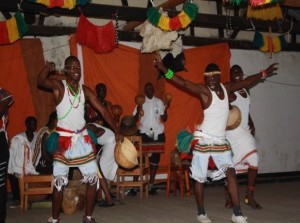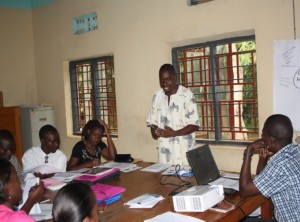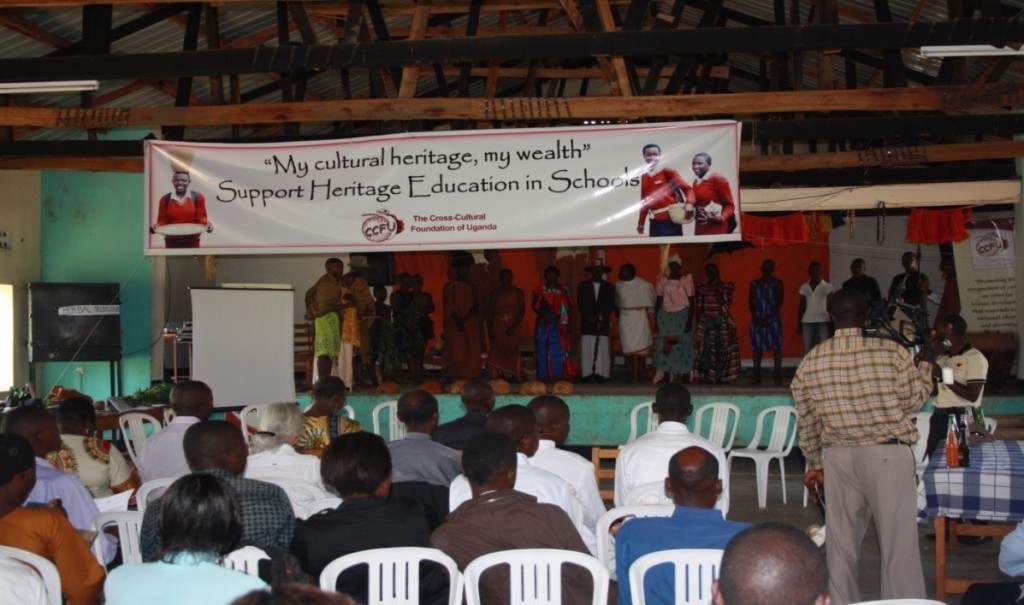-
Working with the youth to promote cultural heritage – The Cross-Cultural Foundation of Uganda.
Posted on October 13, 2014By Evelyne Ninsiima in Uganda.
The Cross-Cultural Foundation of Uganda (CCFU) is one out of three INTO members in Uganda. CCFU is a not-for-profit, non-governmental organization dedicated to promoting the recognition of culture as vital for human development that responds to Uganda’s national identity and diversity.
Since its inception in 2006, the Foundation has been involved in various programs that aim at promoting positive aspects of culture in development. In 2009, CCFU became a member of INTO and has since benefited from being part of this global heritage movement – learning and sharing experiences with individuals and organizations that share a common passion for preserving and promoting tangible and intangible heritage.

Emily Drani,(in blue dress) poses with heritage club students in one of the schools the foundation had visited.
The Foundation believes that the youth are the future custodians of heritage and are key to upholding and preserving many positive aspects of Uganda’s culture. This is, however, a huge task since many youth are hesitant about appreciating culture, mainly because Cultural content is often not packaged in an appealing or sophisticated manner. Thus, creativity and persuasion are basic in triggering the youth’s interest in cultural heritage.
In 2011, CCFU initiated a program that involves students in secondary schools across the country in heritage related activities including the establishment of and support to heritage clubs, and an annual “Cultural Heritage Competition” during which the youth are challenged to reflect on the beauty of heritage and to appreciate its value.
The Heritage Education Program, which links secondary schools to neighboring Community Museums as centers for knowledge on culture, also includes interface between the youth, cultural resource persons and heritage experts to broaden scope of traditional knowledge and skills. The heritage school clubs bring together students of diverse ethnic backgrounds who share a common interest in promoting and preserving cultural heritage.
This may be in form of sharing experiences about their cultural backgrounds, learning about heritage in general, carrying out activities to preserve cultural heritage, promoting and expressing their cultural identity and appreciating other peoples’ cultures. The schools receive support in form of training, teachers’ toolkits,’ maps of heritage sites in the country and other learning aids. The heritage club members receive ‘Heritage Passports’, heritage inscribed pens, caps, t-shirts, bracelets and other motivational materials.
More than 110 teachers have been trained so far, to support heritage clubs and accompany the students on their journey to explore and discover their cultural heritage. This kind of youth involvement provides a sense of identity, pride and belonging, laying a foundation for social cohesion, reflection and innovation.
The heritage clubs depend on committed and well trained teachers. There are about 50 heritage clubs across the country and more are being formed.
The club membership ranges from 25 to 100, led by a chairperson, treasurer and a secretary.
Participating in Heritage clubs comes with benefits to students and their teachers in form of material support, such as self-understanding in respect to their cultural identity, confidence and self-esteem.
Having improved knowledge and skills, and discovering new talents may be a potential source of future income to the benefit of the clubs and especially to the individual, given the high unemployment of youth in Uganda.
These competitions aim at stimulating the youth to appreciate their culture and national cultural diversity through creative writing and art works.
In 2013, the theme of the competition was “Illustrating our favorite poems” and CCFU received more than 100 entries from diverse cultures across the country. The entries were assessed by an independent jury and the best 12 were used to develop the 2014 Cultural Heritage Calendar.
The authors were awarded prizes at a launch event, hosted by Sacred Heart Kiteredde Secondary School Heritage Club in Rakai district.
According to Emily Drani, the Executive Director, CCFU is driven by the desire to preserve and promote heritage and is often pleasantly surprised and highly motivated by partners who exhibit a passion for culture.With each passing year, the Foundation is exposed to new partners, new ways of appreciating and promoting cultural heritage and restored hope for positioning culture as vital for our individual and national development. With a small staff complement, CCFU depends on its partners’ commitment, and works doubly hard to ensure that culture is recognized as an important item on the development agenda.

 44 (0)20 7824 7157
44 (0)20 7824 7157

